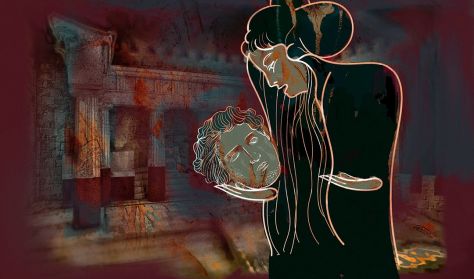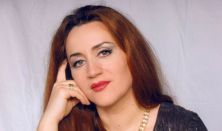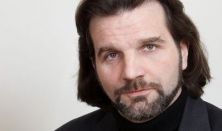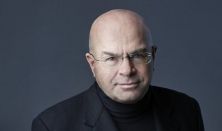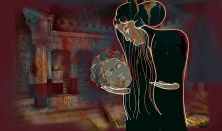In the palace of Herod, Tetrarch of Judaea
Narraboth, a young Syrian soldier is a guard in the palace of Herod, Tetrarch of Judaea. While he is being captivated by the wonderful appearance of Salome, the 16-year-old girl, a page forecasts a terrible tragedy. The tension is further raised by the noise of arguing Jews, and then a mysterious prediction from below: Jochanaan (St. John the Baptist) is preaching, imprisoned by Herod. Salome appears presently; she has run away from Herod’s palace because the Tetrarch was always watching him lustfully. She hears the preaching coming from below, and the strange voice makes her more and more curious but to no avail as Herod has ordered that no one can see the prophet. The ban inflames Salome, who exploits Narraboth’s lustful look. He cannot resist Salome’s attraction and opens the cistern. The prophet – raising from his prison-tomb – appears before us.
The slightly frightened but enchanted Salome watches the huge man, his dark hair falling about his shoulders and his fiery eyes. Jochanaan tries to ignore her and does not even respond to her look, but Salome is not deterred by his slandering of Salome’s mother Herodias and the whole court. In spite of his terrifying words, Salome’s emotions are sparked by the prophet. Perhaps it is the prophet’s resistance that flares her up so much that Salome cannot get away from the thought of kissing Jochanaan. Salome describes the prophet’s beauty with fanatical zeal, and this enhances her desire to the level of madness: she rages, shouts and does everything to get what she wants. She does not accept the man’s refusal and is unable to acknowledge that there is a man on Earth who rejects her. But now Salome cannot achieve what she wants: the prophet curses her and resigns to his prison. And Salome is left alone with her unbridled passion and unsatisfied desires.
On the balcony, Herod and Herodias appear in search of Salome. Herod has misgivings, partly because he is worried about the prophet’s rage and revenge. He is scared when he sees blood on the ground. Narraboth’s dead body is lying before him, he has committed suicide because of his unrequited love for Salome. Herod flatters Salome to lighten his stepdaughter’s mood. But Salome’s thoughts are occupied with the mysterious man down there whom she loves and hates at the same time. The prophet’s voice can be heard continuously: now he is cursing Herodias, who complains as to why Herod does not silence him. But Herod fears the prophet like fire, because “He is a holy man. He is a man who has seen God.”
The increasingly anxious Herod begs Salome to cheer him up, for instance with a dance. Seeing her husband’s lustful look, Herodias forbids her daughter to dance, but when Herod carelessly offers to give the girl anything she desires in exchange, Salome begins to dance. Herodias looks daggers as her husband’s desires are aroused by her own daughter. After the fiery dance, Herod fulfils his promise and asks the girl what she desires. Salome replies indifferently: “I ask the head of Jokanaan in a silver charger!” Herod is begging the girl not to listen to her mother and ask for anything else, treasures or jewellery, but woe betide he who harms the holy man. But Salome is unyielding.
The exhausted Herod is gazing before himself, and Salome is waiting for the beheading, crouching at the edge of the cistern. Dead silence. Salome is listening, straining every nerve to the death rattle, but does not hear anything. “
Why isn’t the prophet screaming?” she asks. Everybody is waiting benumbed. Then the executioner’s sword appears from below and he presents the cut-off head on a silver shield to Salome, who talks to the silent head in the same passionate way as during their first encounter. The outside world ceases to exist for Salome; she herself fulfils her perverted desires, now that she possesses the prophet’s “body”. Even Herod cannot bear the sight of her sensuous lust. Abhorred by this terrible deed, Herod orders his soldiers to kill Salome, and then the veil of night covers everything...
